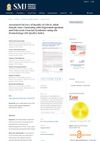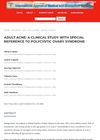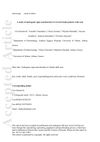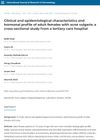 42 citations,
September 2018 in “Journal der Deutschen Dermatologischen Gesellschaft”
42 citations,
September 2018 in “Journal der Deutschen Dermatologischen Gesellschaft” Adult female acne requires a comprehensive treatment approach, including medical options and lifestyle changes, with attention to psychological well-being.
 116 citations,
December 2017 in “International Journal of Women's Dermatology”
116 citations,
December 2017 in “International Journal of Women's Dermatology” Adult female acne treatment should be personalized, considering individual preferences and pregnancy, using various topical and oral medications while managing side effects and resistance.
 4 citations,
April 2016 in “Journal of Dermatology Research and Therapy”
4 citations,
April 2016 in “Journal of Dermatology Research and Therapy” Anti-androgens are safe and effective for treating moderate to severe adult female acne.
 43 citations,
September 2012 in “International Journal of Dermatology”
43 citations,
September 2012 in “International Journal of Dermatology” Hormonal therapies are safe and effective for treating adult women's acne.
 33 citations,
January 2013 in “Dermatology”
33 citations,
January 2013 in “Dermatology” Over half of the adult women with acne in the study had higher than normal levels of male hormones, especially DHEA.
 October 2023 in “Siriraj Medical Journal”
October 2023 in “Siriraj Medical Journal” Acne and hair loss in women can greatly lower their quality of life, but having polycystic ovarian syndrome does not.
 February 2020 in “International Journal of Medical and Biomedical Studies”
February 2020 in “International Journal of Medical and Biomedical Studies” Adult acne is often mild and common on the cheek, with a low prevalence of PCOS in female patients, but more severe acne and skin damage in those with PCOS.
 11 citations,
November 2013 in “Skin Pharmacology and Physiology”
11 citations,
November 2013 in “Skin Pharmacology and Physiology” Azelaic Acid is effective and safe for treating adult female acne, with few side effects.
 12 citations,
May 2017 in “Journal of Dermatological Treatment”
12 citations,
May 2017 in “Journal of Dermatological Treatment” Adult acne severity is influenced by stress, skin sensitivity, makeup, stopping oral contraceptives, and requires female-specific treatment guidelines.
 January 2019 in “Springer eBooks”
January 2019 in “Springer eBooks” Acne can appear or persist in adulthood due to hormonal changes, external factors, or substance use, and requires appropriate treatment.
 2 citations,
January 2018 in “Journal of The European Academy of Dermatology and Venereology”
2 citations,
January 2018 in “Journal of The European Academy of Dermatology and Venereology” Almost 40% of Greek women with acne show signs of androgen-related disorders, with adult women more likely affected.
 January 2018 in “Springer eBooks”
January 2018 in “Springer eBooks” The document says that early treatment of Acne Vulgaris is important to prevent scarring and that adult onset acne is common in women, often due to hormonal imbalances.
 6 citations,
January 2017 in “Dermato-endocrinology”
6 citations,
January 2017 in “Dermato-endocrinology” ADT-G may be a useful indicator of increased androgen levels in women with acne and can be lowered with certain birth control pills.
 April 2021 in “International Journal of Research in Dermatology”
April 2021 in “International Journal of Research in Dermatology” Most adult females with acne do not have hormonal imbalances, but some show signs of excess male hormones.
 29 citations,
March 2017 in “International Journal of Women's Dermatology”
29 citations,
March 2017 in “International Journal of Women's Dermatology” Hormone therapies like birth control pills and spironolactone are safe and effective for treating women's adult acne.

Spironolactone effectively treats female acne with few side effects.
 37 citations,
June 2021 in “Journal of the European Academy of Dermatology and Venereology”
37 citations,
June 2021 in “Journal of the European Academy of Dermatology and Venereology” Adult skin quickly reacts to short-term environmental and internal stress, leading to various skin issues and the need for protective measures.
 9 citations,
June 2020 in “Actas Dermo-Sifiliográficas”
9 citations,
June 2020 in “Actas Dermo-Sifiliográficas” Spironolactone is effective for acne, hidradenitis suppurativa, female hair loss, and hirsutism but is underused in dermatology.
 22 citations,
March 2018 in “American Journal of Clinical Dermatology”
22 citations,
March 2018 in “American Journal of Clinical Dermatology” Hormonal antiandrogen therapy for acne is underused and can reduce the need for antibiotics.
 10 citations,
January 2017 in “Expert Opinion on Pharmacotherapy”
10 citations,
January 2017 in “Expert Opinion on Pharmacotherapy” The conclusion is that more research is needed to better understand and treat adult acne, and that patient education and simple treatment plans are important for better results.
 5 citations,
January 2014 in “Current Dermatology Reports”
5 citations,
January 2014 in “Current Dermatology Reports” Many adult women suffer from persistent or late-onset acne, and while various treatments exist, finding the right one can be challenging.
 January 2014 in “Journal of the Egyptian Women's Dermatologic Society (Print)”
January 2014 in “Journal of the Egyptian Women's Dermatologic Society (Print)” Women with acne after adolescence are more likely to have PCOS and should be checked for it.
 30 citations,
June 2015 in “British Journal of Dermatology”
30 citations,
June 2015 in “British Journal of Dermatology” Acne is common in women, often hormone-related, negatively affects quality of life, and requires various treatments.
 14 citations,
October 2019 in “International Journal of Women's Health”
14 citations,
October 2019 in “International Journal of Women's Health” Menopausal acne is treated with medications and lifestyle changes, but careful choice is needed due to side effects.
 24 citations,
January 2013 in “Indian Journal of Dermatology, Venereology and Leprology”
24 citations,
January 2013 in “Indian Journal of Dermatology, Venereology and Leprology” Hormonal treatment is effective for women with acne not helped by usual treatments, especially if they have hormonal imbalances.
 9 citations,
April 2021 in “Expert opinion on pharmacotherapy”
9 citations,
April 2021 in “Expert opinion on pharmacotherapy” Clascoterone is a new, effective, and safe acne treatment without systemic side effects.
 1 citations,
November 1996 in “Journal of Cutaneous Medicine and Surgery”
1 citations,
November 1996 in “Journal of Cutaneous Medicine and Surgery” Hormones, especially androgens, play a key role in causing acne, and treatments like hormone control pills and hormone-blocking medications can help.
 4 citations,
January 2014 in “Dermatology”
4 citations,
January 2014 in “Dermatology” A woman with acne and baldness was found to have a rare ovarian condition but successfully had a child through fertility treatment.
 6 citations,
February 2023 in “Journal of nanobiotechnology”
6 citations,
February 2023 in “Journal of nanobiotechnology” The new anti-acne treatment HA-P5 effectively reduces acne by targeting two key receptors and avoids an enzyme that can hinder treatment.
 January 2025 in “Dermatology and Therapy”
January 2025 in “Dermatology and Therapy” Hormonal therapies effectively treat acne and improve quality of life.





























